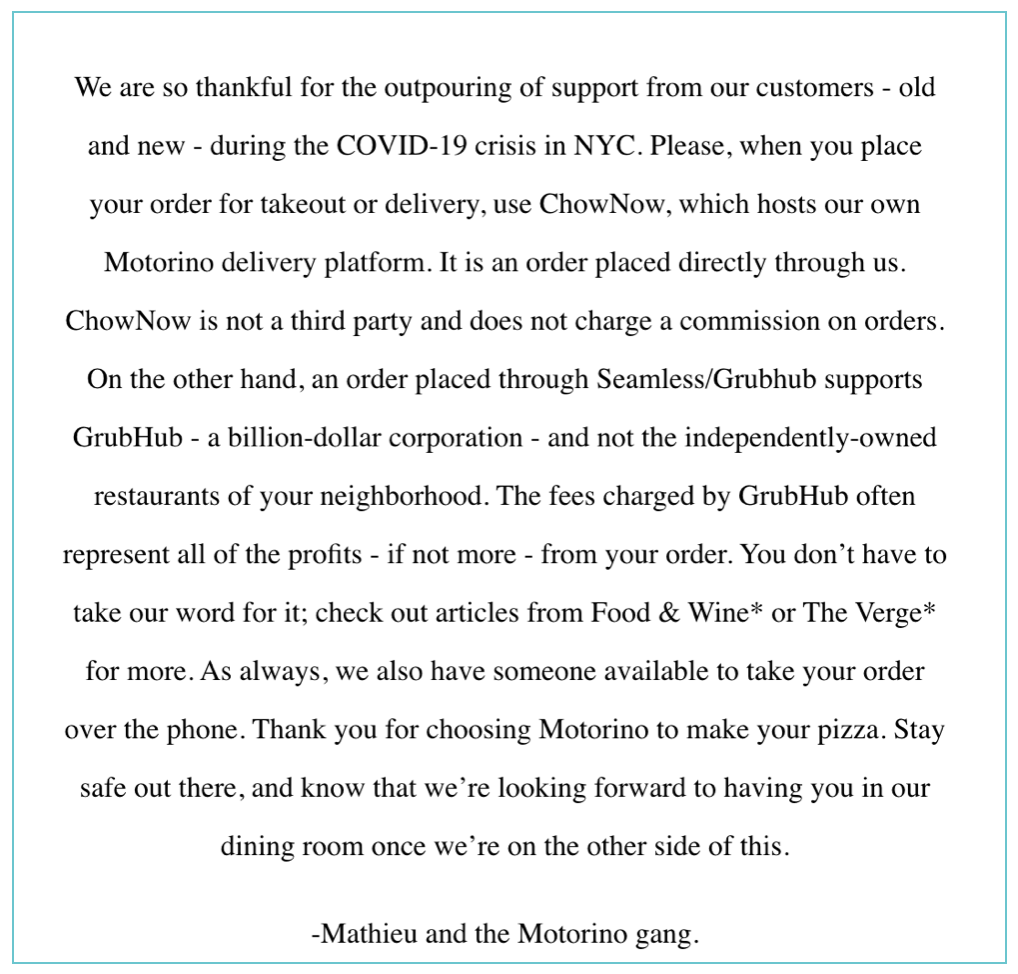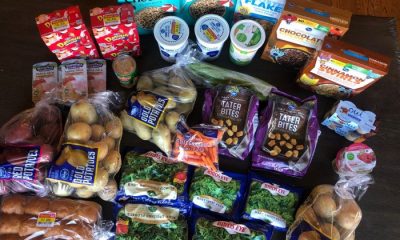Entrepreneur
A Bigger Truth About Restaurant Food Delivery
I was listening to Dan Primack’s podcast on Pro Rata and he was interviewing Senator Klobucher who is now publicly and vocally speaking out against Uber purchasing Grubhub and has tried to mobilize against this.
Her argument is that if Uber buys Grubhub (which itself once merged with Seamless) it would mean that Uber Eats / Grubhub would control half the market and that with DoorDash the two together would control 90% of the market. I think that’s a largely flawed fight to be picking and of all the uses of Senator Klobuchar’s I could think of some much more productive fights to be having.
For starters Uber itself has had to lay off 27% of its workforce due to the pandemic and has been severely impacted financially from the crisis with no immediate respite in sight. Its core business was already struggling to become profitable, so having tertiary businesses like food delivery that can deliver needed profits would be welcome to their financial stability. And the market would still have DoorDash and PostMates duking it out as well as the potential that players like Instacart broaden their business one day or Amazon gets into food delivery.
Even more likely is eventual technology disruption where drones deliver foods and make it hard for existing car delivery services to compete. It won’t happen right away but I’ve seen some innovative companies doing exactly this in places like Australia where they are taking a more liberal approach to allowing drone deliveries. Therein lies the advantages of free markets and competition and if we really believed it were that easy to buy off your largest competitor and be a monopolist we’d all be surfing on AOL TimeWarner portals.
But the broader issue that hasn’t garnered much press attention is how the restaurant industry itself is being transformed and what tools a modern restaurant will need to compete. What is the Shopify of the restaurant industry? I have some compelling data that suggests it may just become ChowNow.
We know that the restaurant business already operates on thin margins and many struggle to survive. So when delivery services came along many were willing to pay the fee to try and increase business. It was only about 10–15% of their actual total revenue per month so for many it wasn’t a battle worth fighting — they just put up with the food delivery company fees. Customers were happy and restaurants focused on their in-store business.
The problem for the restaurants is that the more successful the “aggregators” of customer demand become over time, the less power the restaurants themselves have individually. This will largely be true whether you have 2 strong competitors or 5 because unless a delivery company can make a profit it won’t continue to stay in business.
The delivery companies own the customer relationship and can drive traffic to the most profitable restaurants for them. Obviously if you have a great restaurant brand with differentiated food people search for you by name but for many people looking for pizza, sushi, Mexican food, Thai food, whatever, you might go with the choice put in front of you if it’s being recommended or delivered more quickly. The delivery companies also own many of the assets like the photography so they can make certain options look much more attractive.
So just like when Groupon came out many small merchants welcomed the uptick in traffic, without owning the customer you lose the most valuable asset — the ability to re-market to your customer base and encourage them to become more loyal and more frequent customers. You lose the ability to up-sell and cross-sell products. And just like with Groupon the small businesses ended up having many unprofitable customers.
At Upfront we always took the approach that we wanted to back startups that enabled merchants to own the customer relationship and to increase profits by becoming excellent at marketing and serving ones most loyal customers.
So several years ago we backed a company called ChowNow that enables restaurants to offer self-service ordering for pick-up or delivery and the restaurant owns all of the customer information and relationship — ChowNow is simply a SaaS enablement product.
The company has done well over the past several year but never really captured the same press mindshare as the food delivery companies because when a company shows up at your house you get to know that brand rather than the tech that enables restaurants.
Covid-19 has changed all of that. Whereas pickup & delivery may have been 10–15% of a restaurant’s business before it’s currently 100% and when it’s your entire business the thought of paying huge commissions to a third-party delivery service becomes much less attractive. So while many restaurants knew they eventually needed to invest in better order management software, many had been putting it off.
But just as many product or apparel companies were happy selling at Amazon, Walmart or Nordstrom in the past and have lately realized the importance of Shopify and serving customers directly — so, too, are restaurants. Enter ChowNow.
What data do I have to make the case?
- ChowNow now has 17,000 restaurants using its SaaS platform for take-out and delivery and is adding more than 2,000 / month right now (and trending up)
- 10 million diners now use the ChowNow ordering platform vs. 24 million for GrubHub, so like Shopify while they built the customer base slowly and with capital efficiency they are now rivaling the bigger players in footprint
- Last year they were serving 50,000 customers / day through their platform and did approximately $500 million in GMV (the value of the orders placed), this year they are on track to do $3 billion (with a B) and expect to end the year at a revenue run rate that may top $100 million (yes, I asked for permission to publish these numbers).
If you want to see a short spot that outlines the importance of the restaurant industry arming itself with better software tools to serve and market to their customers you may enjoy this 60-second video that makes it clear why it matters. It speaks volumes to why we all love our local restauranteurs and want to see them survive …
https://medium.com/media/dab8c9b98b12a45a4b06435888cc7fc0/href
Or if you want to see the argument laid out clearly by a customer, look no further than Motorino Pizza in NYC who posted this note that appears before you enter their website:

![]()
A Bigger Truth About Restaurant Food Delivery was originally published in Both Sides of the Table on Medium, where people are continuing the conversation by highlighting and responding to this story.
Entrepreneur
Know When You Arrive! Recognizing the Signs of Success… by @StarrHall
by Starr Hall
How many times have you actually stopped to appreciate your hard work and small successes? Like most people in the early stages of their entrepreneurial journey, I didn’t even know what success looked like. I was unreasonably hard on myself and felt unaccomplished simply because I wasn’t making millions after two years in business.
It wasn’t until I mapped out my business plan as a journey that I realized it is the basic elements that form the foundation for larger successes, or what I like to call…wins. I began to piece it together when my phone would ring after I landed a feature, launched a new website, grew my email list week-over-week, etc… Clients would hire me based on something they read or an email that was shared with them.
Entrepreneurs tend to forget that it is the small victories added up that equate to big ones.
I have tracked some milestones and “win signals” to watch for as you grow your business. Here’s how to know when you are succeeding:
1. Hooked Stage:
In the beginning stages of setting out after your dream or starting a new business, it is taking the first few steps that is truly the largest of small victories. This is the stage when you’ve designed your brand, launched it, and consumers learn what it is you are offering. More than that, they are hungry to hear more. The win: they purchase, refer to you, love the product and show it by leaving a review. In short, they are hooked. Celebrate this! It’s a success.
2. Smalls’ Stage:
“You’re killin it, Smalls!” (Yes, that Smalls from The Sandlot) This is my motto whenever I achieve or reach a small weekly goal. Yes, weekly! The Smalls stage isn’t just about hitting it; more importantly, it’s about focusing on what you did to land the hit. For ex. when you step out of your comfort zone to call someone you never thought you could reach and they answer the phone to hear more. Or when you socially engage and reach out to 100 people a day online instead of sitting back waiting for them to find you. I commit daily to “killin it” by stepping out of my comfort zone and doing at least 5 things that make me want to upchuck. That feeling…it’s a success. Break open some champagne! You deserve it.
3. Defining BIG Stage:
Once you define what BIG looks like, you have achieved success. I’m talking about vision boards, coloring it on a wall, visually putting your BIG vision out there publicly. This is a HUGE win. Once you have a clear vision of where you see your product or service fitting into people’s lives, then define further how many people you see using the product or buying the service. You are then ready to GPS your entire BIG journey. Success…it’s so small and yet so big at the same time.
4. Shameless Stage:
When you build up the self-confidence to talk about your product or service in a way that is compelling and unapologetic, you have arrived. When your passion turns into excitement and unstoppable action-taking which translates into media features and social media influencers wanting to discuss it with you, this is gold. When customers or clients are waiting in line to give you money, this is full-blown, all-out success. Bask in it and breathe it in. Congratulations are in order!
There are hundreds of signs every day that represent success, but you must be open to seeing them . . . And even more committed to celebrating them. Revenue growth is great and should be the end goal primarily, but you can’t generate revenue without hooking your market, “killin it” outside of your comfort zone, defining what big means to you, and shamelessly self-promoting every step of the way. At each of these stages when I celebrate, I say out loud—REPEAT. Keep on keeping on . . . but enjoy the small stuff at every stage. It’s a great way to live and build a brand simultaneously.
 Starr Hall is an entrepreneur who has been in PR/branding/marketing since she was 9 years old. She has owned several small businesses and has worked with dozens of Fortune brands, such as Sprint, RIM, UPS, NHL, Activision, Samsung, Lucky Brand, Downtown Las Vegas, Bragg Live Foods, Experian, Downey Savings & Loan/USBank, True Religion, Express Clothing, and Century 21. She is the author of The Social Wave and Get Connected.
Starr Hall is an entrepreneur who has been in PR/branding/marketing since she was 9 years old. She has owned several small businesses and has worked with dozens of Fortune brands, such as Sprint, RIM, UPS, NHL, Activision, Samsung, Lucky Brand, Downtown Las Vegas, Bragg Live Foods, Experian, Downey Savings & Loan/USBank, True Religion, Express Clothing, and Century 21. She is the author of The Social Wave and Get Connected.
She is also a former columnist and/or contributing writer for Entrepreneur, MSNBC, AOL, AmEx Small Business OPEN, Business Insider, PR Newswire and Biz Trends. Starr was also a contributor to “Success Secrets of the Social Media Marketing Superstars” by Mitch Meyerson.
The post Know When You Arrive! Recognizing the Signs of Success… by @StarrHall appeared first on She Owns It.
Entrepreneur
A Bigger Truth About Restaurant Food Delivery
I was listening to Dan Primack’s podcast on Pro Rata and he was interviewing Senator Klobucher who is now publicly and vocally speaking out against Uber purchasing Grubhub and has tried to mobilize against this.
Her argument is that if Uber buys Grubhub (which itself once merged with Seamless) it would mean that Uber Eats / Grubhub would control half the market and that with DoorDash the two together would control 90% of the market. I think that’s a largely flawed fight to be picking and of all the uses of Senator Klobuchar’s I could think of some much more productive fights to be having.
For starters Uber itself has had to lay off 27% of its workforce due to the pandemic and has been severely impacted financially from the crisis with no immediate respite in sight. Its core business was already struggling to become profitable, so having tertiary businesses like food delivery that can deliver needed profits would be welcome to their financial stability. And the market would still have DoorDash and PostMates duking it out as well as the potential that players like Instacart broaden their business one day or Amazon gets into food delivery.
Even more likely is eventual technology disruption where drones deliver foods and make it hard for existing car delivery services to compete. It won’t happen right away but I’ve seen some innovative companies doing exactly this in places like Australia where they are taking a more liberal approach to allowing drone deliveries. Therein lies the advantages of free markets and competition and if we really believed it were that easy to buy off your largest competitor and be a monopolist we’d all be surfing on AOL TimeWarner portals.
But the broader issue that hasn’t garnered much press attention is how the restaurant industry itself is being transformed and what tools a modern restaurant will need to compete. What is the Shopify of the restaurant industry? I have some compelling data that suggests it may just become ChowNow.
We know that the restaurant business already operates on thin margins and many struggle to survive. So when delivery services came along many were willing to pay the fee to try and increase business. It was only about 10–15% of their actual total revenue per month so for many it wasn’t a battle worth fighting — they just put up with the food delivery company fees. Customers were happy and restaurants focused on their in-store business.
The problem for the restaurants is that the more successful the “aggregators” of customer demand become over time, the less power the restaurants themselves have individually. This will largely be true whether you have 2 strong competitors or 5 because unless a delivery company can make a profit it won’t continue to stay in business.
The delivery companies own the customer relationship and can drive traffic to the most profitable restaurants for them. Obviously if you have a great restaurant brand with differentiated food people search for you by name but for many people looking for pizza, sushi, Mexican food, Thai food, whatever, you might go with the choice put in front of you if it’s being recommended or delivered more quickly. The delivery companies also own many of the assets like the photography so they can make certain options look much more attractive.
So just like when Groupon came out many small merchants welcomed the uptick in traffic, without owning the customer you lose the most valuable asset — the ability to re-market to your customer base and encourage them to become more loyal and more frequent customers. You lose the ability to up-sell and cross-sell products. And just like with Groupon the small businesses ended up having many unprofitable customers.
At Upfront we always took the approach that we wanted to back startups that enabled merchants to own the customer relationship and to increase profits by becoming excellent at marketing and serving ones most loyal customers.
So several years ago we backed a company called ChowNow that enables restaurants to offer self-service ordering for pick-up or delivery and the restaurant owns all of the customer information and relationship — ChowNow is simply a SaaS enablement product.
The company has done well over the past several year but never really captured the same press mindshare as the food delivery companies because when a company shows up at your house you get to know that brand rather than the tech that enables restaurants.
Covid-19 has changed all of that. Whereas pickup & delivery may have been 10–15% of a restaurant’s business before it’s currently 100% and when it’s your entire business the thought of paying huge commissions to a third-party delivery service becomes much less attractive. So while many restaurants knew they eventually needed to invest in better order management software, many had been putting it off.
But just as many product or apparel companies were happy selling at Amazon, Walmart or Nordstrom in the past and have lately realized the importance of Shopify and serving customers directly — so, too, are restaurants. Enter ChowNow.
What data do I have to make the case?
- ChowNow now has 17,000 restaurants using its SaaS platform for take-out and delivery and is adding more than 2,000 / month right now (and trending up)
- 10 million diners now use the ChowNow ordering platform vs. 24 million for GrubHub, so like Shopify while they built the customer base slowly and with capital efficiency they are now rivaling the bigger players in footprint
- Last year they were serving 50,000 customers / day through their platform and did approximately $500 million in GMV (the value of the orders placed), this year they are on track to do $3 billion (with a B) and expect to end the year at a revenue run rate that may top $100 million (yes, I asked for permission to publish these numbers).
If you want to see a short spot that outlines the importance of the restaurant industry arming itself with better software tools to serve and market to their customers you may enjoy this 60-second video that makes it clear why it matters. It speaks volumes to why we all love our local restauranteurs and want to see them survive …
https://medium.com/media/dab8c9b98b12a45a4b06435888cc7fc0/href
Or if you want to see the argument laid out clearly by a customer, look no further than Motorino Pizza in NYC who posted this note that appears before you enter their website:

![]()
A Bigger Truth About Restaurant Food Delivery was originally published in Both Sides of the Table on Medium, where people are continuing the conversation by highlighting and responding to this story.
Entrepreneur
“This is my EO journey”
The Entrepreneurs’ Organization (EO) has been helping entrepreneurs achieve transformational growth since 1987.
Our member network is committed to learning and helping each other succeed. But this network of support and growth goes beyond members. It includes the hundreds of staff and chapter administrators who help the organization run. Beth Chernick was EO New York’s chapter manager from 2003 to 2020. She shares her EO journey here.
I had an absolutely wonderful 17-year run with EO.
My EO journey started in March 2003 when I was hired by then chapter president, Damon Gersh, and his board. My first EO assignment was to work at a learning event hosted by co-learning chairs, Jason Englander and Larry Zogby.
The speaker was Erin Brockovich, the well-known activist and subject of the highly acclaimed movie made in 2000, bearing her name. At the venue, I was seated at the registration table checking off names and meeting EO members for the first time. Everyone was so friendly. Erin’s presentation was fascinating (if you’re not familiar with her story, it’s worth checking out). I remember going home and thinking, “Wow, that was cool”! It was my first sip of the EO Kool-Aid.
A few months later, in May, I attended my first EO Global Leadership Conference (GLC), the annual training conference. Everything about it was first class–prominent keynote speakers, peer-to-peer learning and over-the-top dinners and socials at exclusive access venues.
Best of all, I met so many members, staff and my colleagues from around the world. All the while, my head was spinning with EO lingo, acronyms and new concepts. I knew I was experiencing something special and I was in my element.
Little did I know that several years later, as I established myself in my role as EONY chapter manager, I would be asked to facilitate the learning track for my colleagues at three subsequent GLCs. I was humbled and honored.
In my 17-year tenure, EO has enriched my life in ways I never imagined.
Working behind the scenes with 13 EO New York chapter presidents and 17 chapter boards, liaising with EO board members and staff, learning from expert speakers and traveling the world to attend regional conferences and EO Universities—all have been amazing, life-changing experiences.
I have grown tremendously, both professionally and personally. How can one not grow when surrounded by entrepreneurs and “leaders of leaders”?
Most important to me are the priceless friendships I’ve fostered—the EO bond that always welcomes with open arms no matter what, the bond that never breaks. EO members and families became my extended family.
As many have done over these past several months in quarantine, I’ve reflected on what’s most important to me at this point in my life. Life is short, and there is more I want to accomplish. And so, it is time for me to follow my heart to new adventures.
It has been a wonderful journey, an honor to serve you all. I will treasure my EO years and friendships always. Thank you to all who have supported me over the years. You are near and dear to my heart always. Last, but certainly not least, a huge thank you to my dear friend and long-time EONY member, Jack Kassel, who introduced me to EO so many years ago. I’m forever grateful.
I look forward to our paths continuing to cross.
– Beth Chernick
P.S. Stay in touch!
The post “This is my EO journey” appeared first on THE EO BLOG.
-
 Business3 weeks ago
Business3 weeks agoBernice King, Ava DuVernay reflect on the legacy of John Lewis
-
World News2 weeks ago
Heavy rain threatens flood-weary Japan, Korean Peninsula
-
 Technology2 weeks ago
Technology2 weeks agoEverything New On Netflix This Weekend: July 25, 2020
-
Finance3 months ago
Will Equal Weighted Index Funds Outperform Their Benchmark Indexes?
-
Marketing Strategies7 months ago
Top 20 Workers’ Compensation Law Blogs & Websites To Follow in 2020
-
 World News7 months ago
World News7 months agoThe West Blames the Wuhan Coronavirus on China’s Love of Eating Wild Animals. The Truth Is More Complex
-
Economy9 months ago
Newsletter: Jobs, Consumers and Wages
-
 Finance8 months ago
Finance8 months ago$95 Grocery Budget + Weekly Menu Plan for 8

